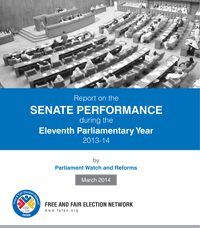Islamabad, March 4th, 2014: The eleventh session of Sindh Assembly proved to be one of the productive sessions with the passage of eleven bills and eighteen resolutions amidst protests, says the Free and Fair Election Network (FAFEN) in its preliminary report.
Eleven treasury backed bills were passed by the House. Four of the passed bills focused on real estate matters i.e. The Prevention of Defacement of Property Bill, 2013, The Sindh Building Control (Amendment) Bill, 2014, The Registration (Sindh Amendment) Bill, 2013 and The Sindh Land Revenue (Amendment) Bill, 2013. The last two bills provide legal cover for the computerization of revenue and land records.
Two other bills were on health sector i.e. The Sindh Health Care Commission Bill, 2013 and The National Institute of Blood Disease & Bone Marrow Transplantation (NIBD) Post Graduate Institute of Life Sciences Bill, 2014 were passed during the session. The government also paid attention to environmental issues by passing two bills of The Sindh Environmental Protection Bill, 2014 and The Sindh Solid Waste Management Board Bill, 2013.
Additionally, The Sindh Emergency Procurement Bill, 2014 also passed by the House which enables the law enforcing agencies to ensure their security by procuring weapons and ammunition in emergency situations for one year. The Sindh Service Tribunals (Amendment) Bill, 2014, The Sindh Civil Servants (Regularization of Ad-hoc Appointments) (Amendment) Bill, 2014 were also passed during the session.
The Mandatory DNA Testing Bill, 2013 and The Sindh Consumer Protection Bill, 2013 were the only two private member bills introduced during the session. However a private member bill, The Registration (Sindh Amendment) Bill, 2013 – appearing on the list of business was withdrawn by the mover as a similar nature of a bill was already passed in the House.
Two reports were laid on the floor. The Finance Committee presented The 2nd Biannual Monitoring on the Implementation of National Finance Commission (NFC) Award for the period of January-June, 2012 and a report on The Sindh Healthcare Commission Bill, 2013 was presented by the Special Committee. While the Special Committee report on the firing incidents of Umerkot and Tharparkar was deferred by the House.
The House unanimously adopted eighteen resolutions out of thirty-five tabled, most of them addressing the law and order situation. As many as seven resolutions sponsored by MQM members were adopted, followed by PPPP (Five), PML-F (Two) and each tabled by PTI member on various issues. Three joint resolutions were also tabled in the House.
Opposition members from MQM dominated the agenda by tabling six out of seven adjournment motions which were taken up by the House whereas only a single motion was moved by PML-F member. Law and order, incidents of honor killing, education and fiscal deficit of provincial government of Sindh were the main issues focused by the MPAs. The recent kidnappings in Khairpur district was also admitted for discussion.
Lawmakers sought the provincial government’s response on various issues by submitting calling attention notices. As many as 35 calling attention notices were tabled by the Sindh Assembly legislators and only 23 were taken up by the House. MQM submitted majority of the notices (14). Whereas PML-F members submitted six calling attention notices and PTI submitted three. These were related to the local Government, education, information, labour, planning & development and special education.
Additionally, sixteen private motions were raised by the members – out of which only five were taken up by the House. Five privilege motions were also raised by the members while only a single was referred to the committee.
Out of 81 starred questions on the agenda, the House took up 61, while the legislators asked 326 supplementary questions. Law makers spoke on 74 points of orders, consuming two hours and fifty four minutes of the proceedings.
MQM members staged three walkouts during the proceedings consuming two hours and nine minutes, over Karachi operation, arrest and torture of MQM worker and alleged victimization of its party workers by Sindh police. Furthermore, two instances of protests by the similar party members were documented over alleged remarks by the Provincial Minister against female member of the opposition party and the other was against the Speaker for not allowing the MQM member to speak on privilege motion raised by his fellow party member.
The session consumed almost a whole month over 12 sittings, spanning from February 3rd to February 28th, 2014. On average each sitting was delayed for an hour and twenty-seven minutes.
The attendance of key members was also low during the entire session, as the Chief Minister attended five sittings (18% of the total session time) while the Leader of the Opposition was present during the nine sittings(22% of total session time). Speaker presided 50% (1167 minutes) while the Deputy Speaker chaired 49% (1134 minutes) of the session time while rest of the time was consumed by breaks.
As the Sindh Assembly does not make the attendance record of its lawmaker’s public, the FAFEN observer conducts a headcount of lawmakers at the beginning and end of the proceedings. In the House of 168 members, on average 53 members were observed to be present at the beginning of the proceedings whereas only 65 were there at the end, a maximum 88 members were documented to present during a point of sitting.
Sindh Assembly legislators were more drawn to submit both agenda and debates as well (21%) whereas 18% took part in debates and 15% only submitted agenda during the proceedings. In proportion to party representation in the House, lawmakers from MQM (76%), PPPP (40%) and PML-F (73%) were among the most active members during the session.
The preliminary report is based on direct observation of Sindh Assembly proceedings conducted by Pakistan Press Foundation (PPF), a member organization of FAFEN.


